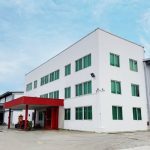CBRE announced on June 22 that it has been appointed as the exclusive marketing agent for the sale of two strata office floors – Level 16 and 23 – at GB Building, which is located at 143 Cecil Street. The sale will be by way of Expression of Interest, which closes on 28 July 2020 at 3pm.

With an area of 5,425 sq ft each, the two strata office floors at Level 16 and 23 feature a regular and column-free layout and enjoy excellent views of the city. Level 16 is currently leased to multiple tenants, while Level 23 is to be sold with vacant possession.
Strategically located at the junction of Cecil Street and McCallum Street, GB Building is a 26-storey office development with a three-level basement car park that can accommodate 105 vehicles. The two strata office floors in GB Building are easily accessible via a fully sheltered walkway from the nearby Tanjong Pagar MRT station.
Clemence Lee, Senior Director of Capital Markets at CBRE says, “GB Building sits within one of the city sub-zones which is expected to benefit from the CBD Incentive Scheme announced last year. As older buildings in the area make way for newer mixed-use developments in the journey of rejuvenation, strata property owners of GB Building can expect to enjoy potential capital appreciation in the mid to long term.”
To be sold either individually or collectively, the two strata office floors at Level 16 and 23 of GB Building have indicative prices of S$11.9 million (approximately S$2,200 per sq ft on strata area) and S$12.7 million (approximately $2,350 per sq ft on strata area), respectively.
Mr Lee adds, “Compared to recent strata office transactions, the indicative prices for these two office floors at GB Building are noticeably competitive. We expect strong interest from investors such as boutique real estate funds, family offices and high-net-worth individuals. Level 23 can also be the space of choice for owner-occupiers seeking immediate occupation in the CBD.”
Three office floors in the CBD were transacted this year – including Level 11 at Samsung Hub which changed hands at S$$49.8 million (S$3,800 per sq ft on strata area), Level 10 at Suntec Tower 1 which was transacted at S$37.1 million (S$2,580 per sq ft on strata area) and Level 33 at Suntec Tower 2 which was traded at S$38 million (S$3,209 per sq ft on strata area).
Both locals and foreigners are eligible to purchase the two strata office floors at GB Building, which is zoned for “commercial” use. There will be no Additional Buyer’s Stamp Duty or Seller’s Stamp Duty imposed on the purchase.
Some landmark developments near GB Building include Asia Square, Frasers Towers, Capital Tower, the upcoming 79 Robinson Road and Afro-Asia I-Mark Building. GB Building is also within proximity to a wide array of amenities from the retail, F&B, entertainment and lifestyle establishments at the nearby OUE Downtown and Amoy Street.
A recent research said office demand and usage will evolve according to corporates’ changing needs in the COVID-19 world. According to JLL’s research, leasing activity softened with global volumes 22% lower than in Q1 2019 as deals were cancelled or delayed. Asia Pacific leasing activity, however, was down only 9% quarter-on-quarter in Q1 2020 and up 14% year-on-year. This has yet to filter through to vacancy rates in Asia Pacific, which were flat compared to a quarter earlier at 10.9%.
“For Singapore, the vacancy rate of Grade A office space in the central business district crept up marginally to 5.0% in 1Q20, from 4.1% in 4Q19 while the average monthly gross effective rents contracted 0.1% quarter-on-quarter to SGD 10.80 per sq ft, from $10.81 per sq/mth in 4Q19,” said Tay Huey Ying, Head of Research & Consultancy, JLL Singapore.
“The current situation poses disruption and challenges for the office sector. The way people view and use corporate real estate will change. However, we can expect the office to remain at the heart of employers’ occupational strategies in Asia Pacific over the medium-to-long-term,” says Anthony Couse, CEO, JLL Asia Pacific.
As companies prioritise the health and safety of their employees and implement social distancing to re-enter workplaces, changes to office demand and usage will be inevitable, according to the report published by JLL. CEOs are re-examining strategies and may consider recalibrating the amount of space dedicated to traditional office space upon lease expiry, or even before.
However, despite current headwinds, the global real estate consultant believes the office is here to stay. In fact, in some cases the pandemic may lead to an expansion of office space, as companies try to increase physical distancing among their employees. Current office configurations may be modified, increasing the need for additional space. In doing so, occupiers may consider tapping into flexible space from third-party operators, alongside continued remote working for some employees.
Not all remote working is created equal
Despite a seemingly successful work-from-home experiment globally, offices will continue to be sought after in this region. Although the pandemic has shifted perceptions around the effectiveness of remote working, it has not presented a sustainable or optimal long-term solution for all corporates.
Huey Ying shared, “In Singapore, while work from home has been feasible for many during the circuit breaker period, it is telling that more than a third of the close to 200 respondents in a recent survey we conducted with Singapore-based corporate clients indicated their preference to work from the office post-COVID19. The lack of a conducive work-from-home environment could be a key contributory factor. Shared homes, which is prevalent in Singapore, makes it difficult for many to have dedicated and conducive home workplaces. According to the Department of Statistic Singapore, the average resident household size stood at 3.16 persons and we estimate that more than 80% of Singapore resident households are living in homes with three or fewer bedrooms in 2019.”
While remote working has been credited with providing employees with more flexibility and work-life balance, offices still play a central role in creating a space for employees to collaborate, interact and unite around shared values, boost staff morale and enhance productivity.






